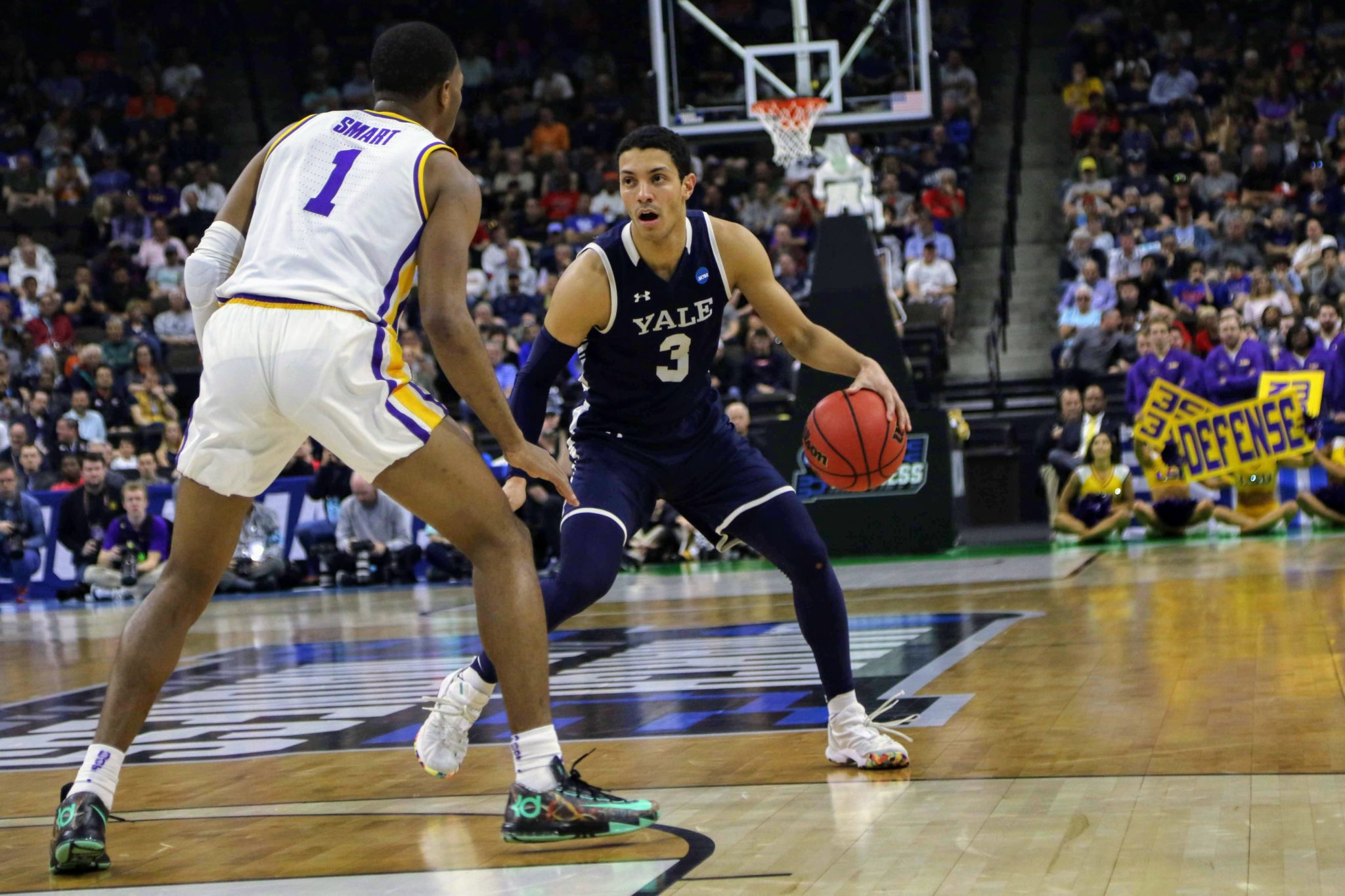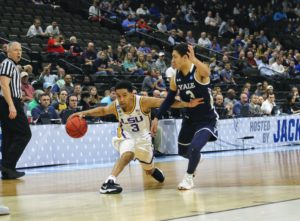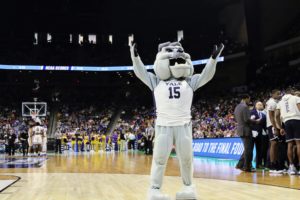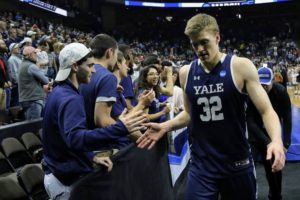MEN’S BASKETBALL: Yale’s postseason run ends after 79–74 tournament loss to No. 3 LSU
The No. 14 Bulldogs did so much right, but fell just a few big shots short.

Joey Kamm
With a 97–85 win over Harvard in the Ivy Madness championship at its own John J. Lee Amphitheater, Yale men’s basketball clinched a spot in the Big Dance for the fifth time in school history. The victory earned the Elis their second NCAA tournament appearance under head coach James Jones and their first since the twelfth-seeded Bulldogs upset fifth-seeded Baylor in the first round of the 2016 tournament — still the school’s only March Madness victory.
In its opening-round NCAA tournament matchup, Yale trailed third-seeded LSU 68–62 with just over 60 seconds remaining but seemed poised to rally and keep the dream of a second-ever NCAA win alive.
The Tigers (27–6, 16–2 SEC) had hit only 10 of their 18 free throw attempts of the game when guard Miye Oni ’20 fouled Tiger guard Javonte Smart after a great three-point look that spiraled out. So when No. 14 Yale (22–8, 10–4 Ivy) started hacking Tigers on the inbounds, hopes of a late-game takeover remained. After shooting only four for 30 from deep for the first 39 minutes, Yale’s rushed pull-up attempts began falling — first it was guard Alex Copeland ’19 on the fast break with 44 seconds to go, then forward Jordan Bruner ’20 in the corner. Copeland hit from deep again while Bruner drained another three-pointer to cut the LSU lead to 77–74 with 8.6 seconds to play.
But LSU calmly knocked down its shots from the charity stripe down the stretch, shooting nine of 10 from the free-throw line in the final minute. After trailing by 16 at halftime, Yale’s sustained second-half comeback and 24 points from Copeland kept the Elis a mere arm’s length from LSU’s lead for much of the period. It forever felt as if Yale was just one key stop and one big shot away from swinging its postseason fate around. LSU benefited from a balanced attack that included double-doubles for forwards Naz Reid and Kavell Bigby-Williams and 19 points from guard Skylar Mays.
“I’m so proud of this group and just the fight that we showed,” Copeland said. “We were in the locker room at halftime, and I think we were a little down for a moment, but we all kind of came together and told each other, look, we can do this. We can fight back. We’ve been down before, and to come out and battle back like that and put on a show for our fans that were here and that were watching across the country feels amazing.”
LSU took a firm grip on the contest with three-point looks from Reid and guard Tremont Waters, but Yale recovered from the early 9–0 deficit with clutch three-point shooting from guard Azar Swain ’21, who finished the game with 12 points. The sophomore three-point specialist connected on two triples after head coach James Jones inserted him and forward Paul Atkinson ’21 into the game with about 15 minutes to play in the half.
Early in the half, Yale lacked confidence driving into the paint which was patrolled by the 6-foot-10, 250-pound Reid and the 6-foot-11, 250-pound Bigby-Williams, who finished the contest with a double-double and four blocks, all of which came in the first half. Reid, the top-20 projected NBA draft prospect, scored 14 in the LSU victory, at one point slamming home a vicious one-handed dunk on the fast break.
“That’s [Bigby-Williams’s] role in this team, he just does that,” Waters said. “Altering shots is something he’s great at. Going into the game we spoke to him about that, and he was able to get three or four blocks, and that kind of made Yale think about going in there a second time, and that’s why they starting shooting pull-ups.”
 With the inside dominated by LSU, who outscored Yale 40 to 30 in the paint, the Bulldogs found good looks from deep. Although they entered the contest with a 37.2 three-point field goal percentage, Yale struggled to find the bottom of the net. The Bulldogs shot 17.6 percent from beyond the arc in the first half. LSU did force poor attempts on a few possessions, but on the whole, strong shots from the Elis simply were not falling. LSU led 45 to 29 at the half.
With the inside dominated by LSU, who outscored Yale 40 to 30 in the paint, the Bulldogs found good looks from deep. Although they entered the contest with a 37.2 three-point field goal percentage, Yale struggled to find the bottom of the net. The Bulldogs shot 17.6 percent from beyond the arc in the first half. LSU did force poor attempts on a few possessions, but on the whole, strong shots from the Elis simply were not falling. LSU led 45 to 29 at the half.
Yale demonstrated spurts of life early in the second half, finding baskets in transition. Copeland and Bruner combined to hit all five of their first shot attempts, scoring an early ten points to reduce LSU’s 16-point lead at the half to 51–41 with slightly less than 15 minutes to play. A Copeland triple directly in front of Yale’s fan section cut the deficit to single digits, firing up the crowd as he strummed his air guitar and returned to the other side of the court to defend against a Tiger onslaught that lost some of its ferocity midway through the half.
“We just woke up,” Bruner said. “At halftime we were down 16 and you realize everything was slipping away. We didn’t want it to be like that. We can’t control if the shots go in or not. We can’t control anything other than how hard we play and the things we do. We came out with a different type of fight and we clawed and scratched our way back into the game.”

The Bulldogs began collecting stops on defense, grabbing defensive boards and running in transition. Yale scored 14 fast-break points in the second half, flaunting its ball movement on the break and finding good looks in the half-court as well. For much of the second half, it felt as if Yale was on the cusp of a game-changing run. The Bulldogs kept the Tigers’ lead under single digits after the 10:27 mark.
LSU’s lead hovered around nine at that point, but after missing a fast-break layup in transition with a little less than three minutes to play, Bruner stole the ball from an LSU defender and drove two paces towards the basket to lay in a two-pointer that cut the deficit to five. Reid, however, responded on the other end after he grabbed an offensive rebound and layed the ball back in with a simple hook. A few possessions later, Oni drove down the right side of the lane and threw down an explosive right-handed jam, his second basket of the contest. LSU guard Marlon Taylor held the Ivy League Player of the Year to five points.
“You’re going to have games where you knock the ball in and [when] you don’t,” Jones said. “You guys all watched the game, like Miye had open shots that just didn’t go down. And he’s hit tougher shots than he had tonight that he missed…certainly [LSU] worked hard to try to limit him. But he’s good enough to get good shots, and I thought we thought we got good shots for him, and they just didn’t fall down.”

On the next possession, Waters drove the lane, but Bruner met him at the rim, sending his shot away. The Elis, however, could not capitalize on the other end. And LSU’s free throw shooting in the final minute allowed the Tigers to ultimately survive Yale’s barrage of last-minute threes and a valiant comeback effort.
The sounding buzzer halted dreams of a Cinderella story, and the score cemented at 79–74. An appreciative ovation from the Eli faithful celebrated the team and its four seniors — Copeland, guards Thomas Ryan ’19 and Trey Phills ’19 and forward Blake Reynolds ’19 — as they walked off the court after their last game in the Blue and White.
“Through that stretch we were doing a good job on defense,” Reynolds said. “That’s a portion of the game that I’m going to think about a lot, looking back on it, that we couldn’t quite take the lead or quite get over the hump there.”
No. 3 LSU’s win over No. 14 Yale set the Tigers against No. 6 Maryland, a game it won 69–67 on Saturday thanks to a last-second Waters layup, and concluded the Bulldogs’ 22-win season.

William McCormack | william.mccormack@yale.edu
Cristofer Zillo | cris.zillo@yale.edu







